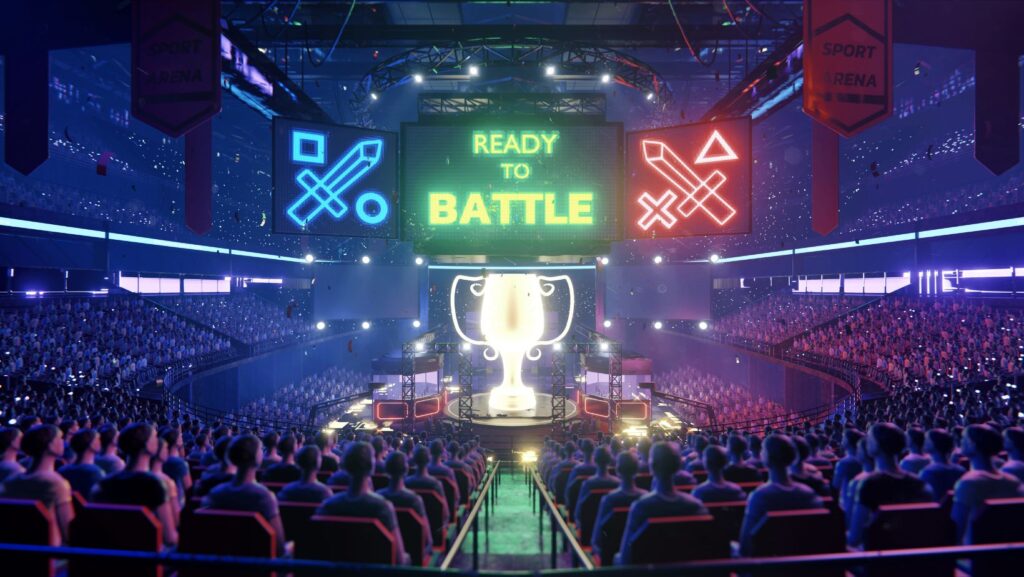 Esports, the competitive world of video gaming, has skyrocketed in popularity over the past decade. What was once a niche hobby has transformed into a global phenomenon, drawing millions of viewers and generating billions in revenue. From intense tournaments to professional leagues, esports has cemented its place in mainstream culture. This digital sport attracts a diverse audience, from casual gamers to dedicated fans who follow their favorite teams and players religiously. With advancements in technology and streaming platforms, watching esports has never been easier. As the industry continues to grow, it’s clear that esports isn’t just a trend—it’s a significant force reshaping the entertainment landscape.
Esports, the competitive world of video gaming, has skyrocketed in popularity over the past decade. What was once a niche hobby has transformed into a global phenomenon, drawing millions of viewers and generating billions in revenue. From intense tournaments to professional leagues, esports has cemented its place in mainstream culture. This digital sport attracts a diverse audience, from casual gamers to dedicated fans who follow their favorite teams and players religiously. With advancements in technology and streaming platforms, watching esports has never been easier. As the industry continues to grow, it’s clear that esports isn’t just a trend—it’s a significant force reshaping the entertainment landscape.
E-Sports or Esports
The Rise of Competitive Gaming
 Competitive gaming, often referred to as esports, has seen exponential growth in the past decade. Major tournaments like The International and the League of Legends World Championship attract millions of viewers worldwide. Prize pools for these events reach millions of dollars, with the most prestigious tournaments offering up to $40 million in total prizes. Developers invest heavily in creating balanced and engaging multiplayer experiences. For instance, Riot Games spent years refining “League of Legends” to ensure a fair competitive environment. Streaming platforms like Twitch, YouTube Gaming, and Facebook Gaming have significantly boosted accessibility, allowing fans to watch their favorite players and teams in real-time.
Competitive gaming, often referred to as esports, has seen exponential growth in the past decade. Major tournaments like The International and the League of Legends World Championship attract millions of viewers worldwide. Prize pools for these events reach millions of dollars, with the most prestigious tournaments offering up to $40 million in total prizes. Developers invest heavily in creating balanced and engaging multiplayer experiences. For instance, Riot Games spent years refining “League of Legends” to ensure a fair competitive environment. Streaming platforms like Twitch, YouTube Gaming, and Facebook Gaming have significantly boosted accessibility, allowing fans to watch their favorite players and teams in real-time.
Differences Between Esports and Traditional Sports
 Unlike traditional sports requiring physical exertion, esports focus on mental agility and hand-eye coordination. Professional esports athletes train for hours each day, honing their reaction times and strategic thinking. Despite the physical differences, the level of dedication mirrors that found in traditional sports. The digital nature of esports allows for unique game mechanics and genres, such as MOBAs (Multiplayer Online Battle Arenas) and FPS (First-Person Shooters). Traditional sports often involve a single playing field or court, while esports can take place in various fantastical virtual environments. Monetization in esports involves sponsorships, streaming revenue, and digital purchases like skins and battle passes. Conversely, traditional sports generate revenue through ticket sales, broadcasting rights, and merchandise.
Unlike traditional sports requiring physical exertion, esports focus on mental agility and hand-eye coordination. Professional esports athletes train for hours each day, honing their reaction times and strategic thinking. Despite the physical differences, the level of dedication mirrors that found in traditional sports. The digital nature of esports allows for unique game mechanics and genres, such as MOBAs (Multiplayer Online Battle Arenas) and FPS (First-Person Shooters). Traditional sports often involve a single playing field or court, while esports can take place in various fantastical virtual environments. Monetization in esports involves sponsorships, streaming revenue, and digital purchases like skins and battle passes. Conversely, traditional sports generate revenue through ticket sales, broadcasting rights, and merchandise.
Major Esports Games
First-Person Shooters (FPS)
FPS games like Counter-Strike: Global Offensive and Overwatch dominate the esports scene. CS:GO, developed by Valve and Hidden Path Entertainment, focuses on team-based tactical gameplay, emphasizing strategy and precision. Overwatch, by Blizzard Entertainment, combines traditional FPS elements with unique hero abilities, offering diverse gameplay styles. These games often feature competitive leagues and tournaments, such as the CS:GO Major Championships and the Overwatch League, with significant prize pools and viewership.
Multiplayer Online Battle Arenas (MOBA)
MOBA games, such as League of Legends and Dota 2, are central to the esports ecosystem. Developed by Riot Games, League of Legends requires strategic planning and team coordination, showcasing players’ skills in roles like top laner, mid laner, and jungler. Dota 2, created by Valve, also relies on strategic depth and features complex mechanics. Major tournaments include the League of Legends World Championship and The International, offering multi-million dollar prize pools and attracting millions of viewers globally.
Real-Time Strategy Games
Real-Time Strategy (RTS) games, though less prevalent than FPS or MOBA, still have a dedicated following. StarCraft II, developed by Blizzard Entertainment, is a quintessential RTS game in esports. It demands quick decision-making and resource management, with players often competing in one-on-one matches. Major tournaments, such as the StarCraft II World Championship Series, continue to draw audiences and showcase top-tier strategic play.
Growth of Esports Popularity
Esports has garnered a massive global audience, attracting millions to streamed and live events. In 2021, the global esports audience reached around 474 million viewers, making it one of the fastest-growing entertainment sectors. Major tournaments, such as The International for Dota 2, LoL World Championship, and Overwatch League, solidify the worldwide appeal of esports. These events offer substantial prize pools, with The International 10 boasting over $40 million in total.Countries like South Korea, China, and the United States are key players in the esports industry, hosting numerous events and fostering professional teams. Additionally, cities like Los Angeles, Seoul, and Shanghai have become hubs for esports, regularly filling stadiums for significant tournaments. The increasing public interest in these events indicates a shift in viewing habits, with traditional sports audiences also gravitating towards esports.



